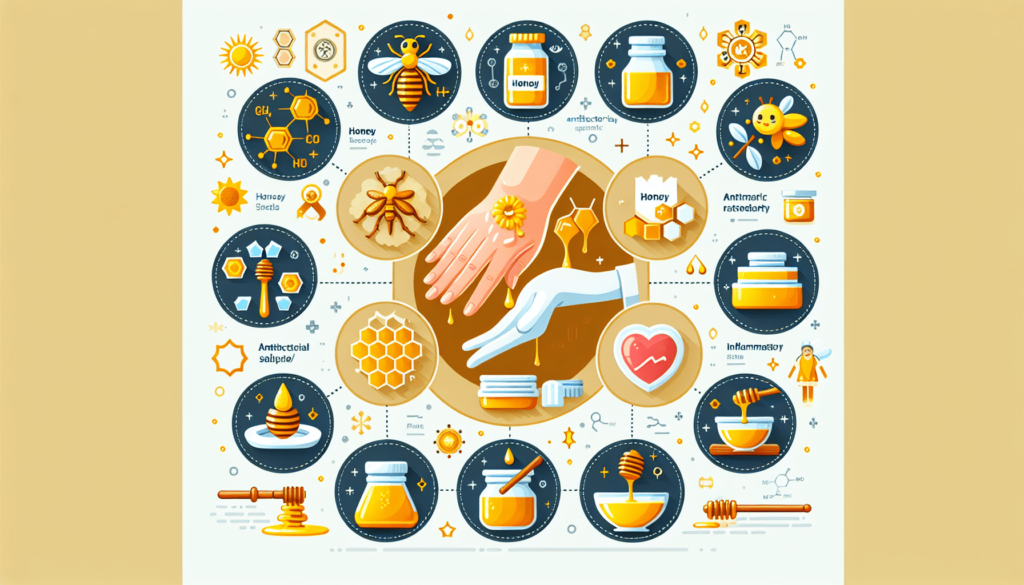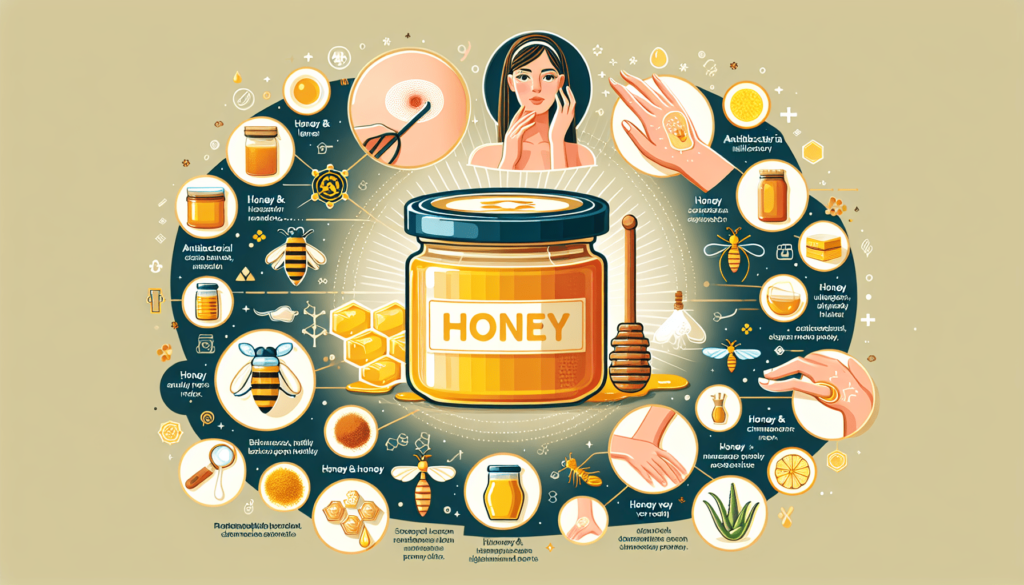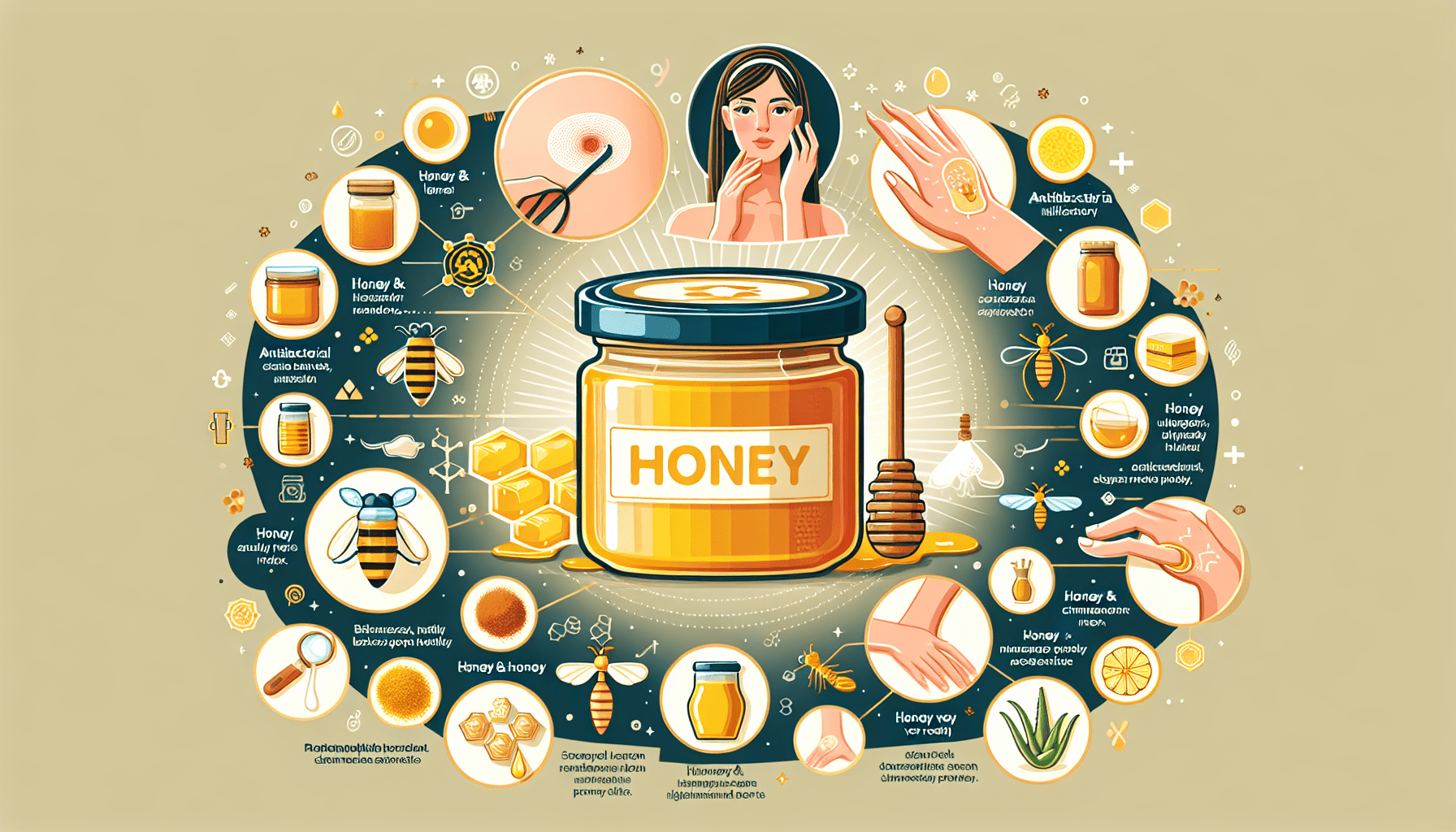In this article, you will discover the fascinating ways in which honey can work wonders for wound healing and overall skin health. Honey, a natural and age-old remedy, has been used for centuries to treat various ailments. Its unique properties, such as antibacterial and anti-inflammatory qualities, make it a powerful ally in promoting healing and maintaining healthy skin. Whether you’re dealing with a cut, burn, or acne, let’s explore how honey can be your go-to solution for nurturing your skin back to health.

Antibacterial properties of honey
Honey’s natural antimicrobial activity
Honey has been used for centuries for its natural antimicrobial properties. It contains various compounds that contribute to its ability to inhibit the growth of bacteria. One of the main components is hydrogen peroxide, which has potent antimicrobial effects. Additionally, honey contains phenolic compounds such as flavonoids and phenolic acids, which further contribute to its antimicrobial activity. These compounds work together to create an environment that is unfavorable for bacterial growth.
Inhibition of bacterial growth
Research has shown that honey has the ability to inhibit the growth of various bacteria, including antibiotic-resistant strains. The high sugar content of honey creates a hypertonic environment, which draws water out of the bacterial cells, causing them to dehydrate and die. Honey also has a low pH level, ranging from 3.2 to 4.5, which creates an acidic environment that inhibits the growth of bacteria. This inhibitory effect of honey on bacterial growth makes it a valuable tool in wound management and the prevention of infections.
Enhancing immune response
In addition to its direct antimicrobial effects, honey has been found to enhance the immune response. It stimulates the production of immune cells, such as macrophages and neutrophils, which are responsible for the elimination of bacteria and other pathogens. Honey also promotes the release of cytokines, which are signaling molecules that regulate the immune response. By enhancing the immune response, honey helps to strengthen the body’s defense against bacterial infections.
Anti-inflammatory effects of honey
Reduced swelling and redness
Honey has been found to have anti-inflammatory effects, which can help reduce swelling and redness associated with various skin conditions. The anti-inflammatory properties of honey are attributed to its high antioxidant content, as well as its ability to inhibit the release of inflammatory mediators. When applied topically, honey can help soothe inflamed skin and provide relief from symptoms such as itching and irritation.
Relief from pain
In addition to reducing inflammation, honey can also provide relief from pain. The application of honey to wounds or inflamed skin has been shown to have analgesic properties. Honey acts as a natural pain reliever by inhibiting the transmission of pain signals and reducing nerve sensitivity. This can be particularly beneficial for individuals with chronic wounds or skin conditions, where pain management is essential.
Promotion of healing
Honey’s anti-inflammatory effects also contribute to the promotion of healing. By reducing inflammation, honey helps create an optimal environment for tissue regeneration and repair. It stimulates the proliferation of fibroblasts, which are cells responsible for producing collagen, the main structural protein in the skin. This promotes the formation of new tissue and speeds up the healing process. Honey’s ability to promote healing is particularly beneficial for wounds that are slow to heal or have become chronic.
Moisturizing properties of honey
Hydrating the skin
Honey is a natural humectant, which means it has the ability to attract and retain moisture. When applied topically, honey draws moisture from the environment and binds it to the skin, increasing hydration. This moisturizing effect helps to keep the skin soft, supple, and hydrated. Regular use of honey can help prevent dryness and maintain a healthy moisture balance in the skin.
Preventing moisture loss
In addition to hydrating the skin, honey also forms a protective barrier that helps prevent moisture loss. It creates a thin film on the surface of the skin, sealing in moisture and preventing it from evaporating. This barrier function is especially beneficial for individuals with dry or sensitive skin, as it helps to improve the skin’s natural ability to retain moisture. By preventing moisture loss, honey contributes to the overall health and well-being of the skin.
Soothing dry and itchy skin
Dry and itchy skin can be a common problem for many individuals. Honey can help soothe and alleviate these symptoms due to its moisturizing and anti-inflammatory properties. When applied to dry or itchy areas, honey provides immediate relief by moisturizing the skin and reducing inflammation. It helps to calm irritated skin and relieve itching, making it a valuable ingredient in skincare products for individuals with dry or sensitive skin conditions.

Antioxidant benefits of honey
Scavenging free radicals
Honey is rich in antioxidants, which are compounds that help protect the body from oxidative stress and damage. Oxidative stress occurs when there is an imbalance between free radicals and antioxidants in the body. Free radicals are highly reactive molecules that can cause damage to cells and tissues. The antioxidants present in honey help scavenge these free radicals, neutralizing their harmful effects and protecting the skin from oxidative damage.
Protecting against oxidative damage
Oxidative damage is a major contributor to skin aging and the development of various skin conditions. The antioxidants in honey help protect the skin against oxidative damage by inhibiting the formation of free radicals and reducing the effects of oxidative stress. This can help slow down the aging process, prevent the development of wrinkles and fine lines, and promote overall skin health and vitality.
Delaying aging signs
The antioxidant benefits of honey extend beyond protection against oxidative damage. Regular use of honey can help delay the signs of aging and maintain youthful-looking skin. The antioxidants in honey support collagen production, which is essential for maintaining the strength and elasticity of the skin. By promoting collagen synthesis, honey helps to reduce the appearance of wrinkles, improve skin texture, and restore a more youthful complexion.
Promotion of tissue regeneration
Stimulating collagen production
Collagen is a key component of the skin’s structure and plays a crucial role in tissue regeneration. Honey has been found to stimulate collagen production, which promotes the growth of new tissue and accelerates wound healing. By enhancing collagen synthesis, honey helps to strengthen the skin and improve its overall appearance. It can be particularly beneficial for individuals with scars, stretch marks, or other skin imperfections.
Enhancing epithelialization
Epithelialization is the process by which new skin cells migrate and cover a wound to promote healing. Honey has been shown to enhance epithelialization, making it an effective treatment for wounds and skin injuries. It provides a moist environment that supports the migration of epithelial cells and the formation of healthy new tissue. Honey’s ability to enhance epithelialization is one of the reasons why it is widely used in wound dressings and other skincare products.
Speeding up wound healing
Due to its various healing properties, honey has been found to significantly speed up the wound healing process. It helps to reduce inflammation, prevent infections, promote tissue regeneration, and improve overall wound closure. Honey’s ability to accelerate wound healing is particularly valuable for individuals with chronic wounds or conditions that slow down the healing process. By incorporating honey into wound care routines, individuals can experience faster healing and improved outcomes.
Management of chronic wounds
Treating diabetic ulcers
Diabetic ulcers are a common complication of diabetes and can be challenging to manage. Honey has been found to be an effective treatment for diabetic ulcers by promoting healing and preventing infections. Its antimicrobial properties help reduce the risk of bacterial contamination, while its ability to stimulate tissue regeneration accelerates the healing process. Additionally, honey’s anti-inflammatory effects can help alleviate pain and reduce inflammation associated with diabetic ulcers.
Healing pressure sores
Pressure sores, also known as bedsores or pressure ulcers, are a common problem for individuals who are bedridden or have limited mobility. Honey can be an effective treatment for pressure sores due to its antimicrobial and wound-healing properties. It helps prevent infections and promotes tissue regeneration, allowing for faster healing of pressure sores. The moisturizing properties of honey also help keep the surrounding skin healthy and prevent the formation of new pressure sores.
Preventing infections in burns
Burns are prone to infections and can delay the healing process. Honey has been used for centuries to treat burns and prevent infections. Its antimicrobial activity helps reduce the risk of bacterial contamination and promote a sterile environment for wound healing. The moisturizing and anti-inflammatory properties of honey also help soothe burned skin and alleviate pain. By using honey as part of burn management, individuals can improve healing outcomes and reduce the risk of complications.
Use of honey in skincare products
Inclusion in creams and lotions
Honey is a popular ingredient in skincare products, particularly creams and lotions. Its moisturizing, anti-inflammatory, and antimicrobial properties make it a valuable addition to these formulations. Creams and lotions containing honey help hydrate the skin, reduce inflammation, and prevent bacterial growth. They provide a nourishing and protective barrier that keeps the skin healthy and promotes its natural healing processes.
Incorporation in face masks
Face masks are a popular skincare treatment that can help address various skin concerns. Honey is often incorporated into face masks due to its numerous benefits for the skin. Honey face masks can help hydrate the skin, reduce inflammation, and promote a healthy complexion. They are particularly beneficial for individuals with dry or sensitive skin, as they provide intense hydration and soothing effects.
Usage in wound dressings
Honey has long been used in the production of wound dressings due to its exceptional healing properties. Dressings containing honey provide an optimal environment for wound healing by protecting the wound from infections, promoting tissue regeneration, and maintaining a moist environment. Honey-based dressings are commonly used for chronic wounds, burns, and other types of wounds that require advanced wound care.
Different types of honey for skin health
Manuka honey
Manuka honey is a type of honey that is derived from the nectar of the manuka tree in New Zealand. It is known for its high antibacterial activity, making it an excellent choice for the treatment of wounds and skin infections. Manuka honey has been found to have superior antimicrobial properties compared to other types of honey, making it one of the most sought-after varieties for skincare purposes.
Raw honey
Raw honey refers to honey that has not been processed or heated, thus retaining its natural enzymes and nutrients. Raw honey retains all the beneficial properties that make honey a valuable ingredient for skincare. It contains a wide range of vitamins, minerals, antioxidants, and enzymes that contribute to its healing and rejuvenating effects on the skin.
Acacia honey
Acacia honey is a light-colored honey that is derived from the nectar of the acacia tree. It is known for its mild and delicate flavor, as well as its high fructose content. Acacia honey has moisturizing and soothing properties, making it an excellent choice for individuals with dry or sensitive skin. Its gentle nature makes it suitable for individuals with skin conditions such as eczema or psoriasis.
Precautions and considerations
Avoidance in infants
While honey offers numerous benefits for adults, it should be avoided in infants under the age of one year. Honey can contain spores of the bacterium Clostridium botulinum, which can cause infant botulism, a rare but serious condition. Infants have not yet developed the necessary immune defenses to fight against this bacterium, making them more susceptible to infection. It is crucial to refrain from giving honey to infants and to consult with a healthcare professional if there are any concerns.
Allergic reactions to honey
Although rare, some individuals may experience allergic reactions to honey. Allergies to honey are typically associated with pollen allergies. If you have known allergies to bee stings, pollen, or other bee products, it is important to exercise caution when using honey topically. Always perform a patch test before applying honey to a large area of skin and discontinue use if any adverse reactions occur. If you have a severe allergy to honey or bee products, it is best to avoid using honey in skincare products altogether.
Choosing high-quality honey
When using honey for skincare purposes, it is important to choose a high-quality product. Look for honey that is raw, unprocessed, and sourced from reputable producers. Avoid honey that has been heavily processed or contains additives, as these may diminish its therapeutic properties. If possible, opt for honey that is organic and free from pesticides and other contaminants. The quality of the honey will ultimately determine its efficacy and potential benefits for the skin.
Conclusion
Honey is a remarkable natural ingredient that offers numerous benefits for skin health. From its antibacterial properties to its anti-inflammatory effects and moisturizing abilities, honey has a wide range of applications in skincare. It promotes tissue regeneration, speeds up wound healing, and provides relief from various skin conditions. With its antioxidant benefits and potential anti-aging effects, honey is truly a powerhouse ingredient for maintaining healthy and vibrant skin. Further research into the potential applications of honey in skincare is ongoing, and its healing powers continue to be harnessed for the benefit of individuals seeking natural and effective skincare solutions.

